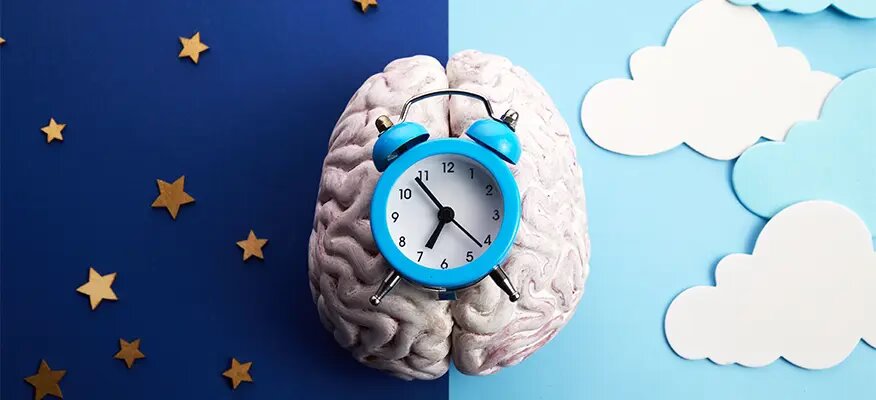Sleep is one of the most critical components of health and wellbeing, serving as a time when the body and mind undergo essential restorative processes.
Despite its importance, sleep is often not regarded as a valuable contributor to good health in modern society, where busy schedules and constant connectivity can lead to insufficient or poor-quality sleep.
Until recently, the prevailing viewpoints on sleep were often negative. For example, Previously, sleep was felt to be an inconvenient “waste” of time and being able to “function” on a small amount of sleep was associated with strength, courage, or productivity.
However, New insights are beginning to challenge these viewpoints. Sleep is now equated with health at the physical, mental, and emotional level. At the same time, it has been proven that Sleep is a key to performance.
Understanding sleep’s role in health, recognizing signs of sleep problems, and implementing effective strategies to improve sleep can have profound effects on overall health and wellbeing.
Sleep Stages

NREM Sleep

- During NREM stages, sensation and perception are dulled or absent, thoughts are logical, perseverative, and movement is episodic and involuntary.
- NREM sleep is made up of three sleep stages
1. NREM stage 1 sleep
- Stage 1 makes up ~2% of the night.
- This is the stage through which we enter sleep and usually only experience it at the very beginning of the night.
- It is characterized by slowing brain waves.
2. NREM stage 2 sleep
- Roughly 50% of the night is spent in stage
- This stage is characterized by sleep spindles and k-complexes on EEG (electroencephalogram) recordings.
- Dreams can occur during this stage, but are usually very logical and not like dreams experienced during REM.
3. NREM stage 3 sleep
- 20–25% of the night is spent in stage 3.
- This Stage is also called slow wave or deep sleep.
- This stage is characterized by delta waves on EEG recordings.
- Most of stage 3 sleep occurs during the first half of the night.
- Deep sleep is important for short-term to long-term memories and restoration of the body (boosting immune system and restoring bones, muscles, and tissues).
Download Mind is Medicine APP now – Enjoy more deep sleep sessions for body healing and health restoration
REM Sleep

- During REM, sensation and perception are vivid and internally generated, thought is illogical and bizarre, and body movement is inhibited.
- 20–25% of the night is spent in REM.
- The first REM episode occurs 90–120 minutes after sleep onset.
- REM periods increase in duration throughout the night, so the majority of REM occurs during the second half of the night.
- Brain activity is highest during REM, however body movement is largely restricted to the eyes and diaphragm due to concurrent muscle atonia.
- REM sleep is important for memory consolidation and promotes brain development.
- REM sleep is also considered the stage in which emotional consolidation occurs.
- Dreaming occurs primarily during REM sleep.
Effects of Chronic sleep deprivation or poor-quality sleep on health and wellbeing.

Sleep is far more than just a period of rest; it is a highly active time for the body and brain. During sleep, the body performs several vital functions, such as repairing tissues, consolidating memories, regulating hormones, and strengthening the immune system. These processes are crucial for maintaining physical and mental health. Lack of sufficient sleep contributes to chronic illnesses.
Cardiovascular Health:
- Poor sleep is associated with an increased risk of hypertension, heart disease, and stroke and increased risk of death from these conditions.
- This is partly due to the role sleep plays in regulating blood pressure and inflammation. Poor sleep leads to elevated sympathetic tone, Endothelial injury and disordered lipid metabolism.
Metabolic Health:
- Sleep deprivation affects glucose metabolism leading to higher glucose levels and appetite regulation, increasing the risk of obesity, type 2 diabetes, and metabolic syndrome.
- Higher nighttime cortisol and glucose levels
- Lower daytime leptin levels and higher intake of carbohydrate-dense foods
- Reduced testosterone levels
- Reduced growth hormone levels
- Increased deposition of advanced glycation end products (AGEs) into the vascular system 8. Dyslipidemia 9. Endothelial dysfunction
Mental Health:
- Insufficient sleep is strongly linked to mental health disorders, including depression, anxiety, and cognitive decline.
- Sleep helps regulate mood and cognitive functions, and disruptions can exacerbate or contribute to these conditions.
- Appropriate duration and timing of REM (rapid eye movement) sleep is connected to enhanced learning and memory, faster cognitive processing and greater resolution of anxiety and fear
Immune Function:
- Sleep is essential for immune system function. -Chronic sleep deprivation can impair the body’s ability to fight infections and increase susceptibility to illnesses.
Importance of sleep in Health and Wellbeing

Sufficient sleep duration and quality promote health and wellbeing in the following ways.
- It produces beneficial physiologic and metabolic changes including Lower cortisol and glucose levels, Greater insulin sensitivity and reduced food-seeking behaviors.
- It improves and reduces the risk of cardiovascular disorders. like heart disease, high blood pressure, and stroke in the following ways.
- It lowers sympathetic tone and blood pressure,
- Leads to greater nighttime peripheral perfusion and core body temperature cooling
- Increases stamina and faster cardiovascular recovery time
- Improved immune function: Quality sleep strengthens the immune system, helping the body fight off infections and illnesses more effectively.
- It enhances antibody production and reduces inflammation.
- It facilitates recovery from illness and injuries.
Download Mind is Medicine APP now & Improve your sleep quality for better health.
- Better Cognitive Function: Quality sleep improves memory, attention, decision-making, and problem-solving skills. It enhances learning and the ability to process and retain new information.
- Emotional Stability: Sleep regulates mood and reduces the risk of mental health disorders such as depression and anxiety. It also helps in managing stress more effectively.
- Increased Energy: Proper sleep replenishes energy levels, leading to higher productivity and better performance in daily tasks and activities.
- Improved Focus: With sufficient sleep, concentration and focus improve, reducing the likelihood of errors and accidents.
- Creativity: Restorative sleep fosters creativity and innovative thinking by allowing the brain to make new connections between ideas and concepts
- Regulation of Hormones: Sleep helps maintain a balance of hormones that control hunger, stress, and growth. It influences the production of hormones like cortisol (stress hormone), ghrelin (hunger hormone), and leptin (satiety hormone).
- Metabolic Health: Good sleep supports healthy metabolism and reduces the risk of conditions like diabetes by improving insulin sensitivity.
- Extended Lifespan: Regular, quality sleep is associated with a longer lifespan by lowering the risk of chronic diseases and promoting overall health.
- Better Relationships: Adequate sleep enhances mood and patience, which are crucial for maintaining healthy and positive relationships. It also improves social perception, making it easier to read and respond to social cues.
- Cell Repair: During sleep, the body repairs and regenerates cells, muscles, and tissues, promoting faster recovery from injuries and maintaining muscle mass.
- Weight Management: Adequate sleep helps regulate hormones that control appetite, reducing the likelihood of overeating and weight gain.
Identifying Insufficient or Poor-Quality Sleep

Recognizing the signs of insufficient or poor-quality sleep is crucial for early intervention.
Common indicators of insufficient sleep and poor sleep quality include:
- Daytime Sleepiness: Feeling excessively sleepy during the day, particularly in the morning or afternoon.
- Difficulty Concentrating: Struggling with focus, memory, and decision-making can indicate sleep deprivation.
- Mood Changes: Increased irritability, anxiety, or depressive symptoms may be linked to poor sleep.
- Physical Symptoms: Frequent headaches, unexplained aches, or a weakened immune system could be signs of sleep problems.
- Difficulty Waking Up: Struggling to wake up in the morning or feeling unrefreshed after a full night’s sleep.
Lifestyle Interventions to Improve your Sleep Health

Improving sleep often requires making lifestyle changes. Key interventions include:
Establishing a Sleep Schedule:
- Going to bed and waking up at the same time every day helps regulate the body’s internal clock.
- Establishing regular and consistent sleep-wake patterns also promotes our body’s natural temperature rhythms.
Creating a Sleep-Conducive Environment:
- A quiet, dark, and cool bedroom can promote better sleep. Investing in a comfortable mattress and pillows is also essential.
- Our bodies cannot regulate body temperature during sleep like it does during wake. Thus, making sure the environment is cool (not cold) is optimal.
- Noise in the sleep environment can disrupt sleep, even without a person knowing it is the cause. 1. Noises may come from both inside and outside the sleep environment.
- The use of “white noise” (a consistent, non-variable noise) can create a sound buffer to minimize other sound sources.
- Remove most light sources and reduce the impact of night-lights within the room. An eye mask or Blackout curtains over windows can be used.
Dietary changes. - Eliminate nighttime caffeinated beverages.
- Limit daytime caffeinated beverages particularly from late afternoon onwards.
- Avoid alcohol within 3 hours of bed.
- Eliminate after-dinner and late-night snacking.
- Avoid high-sodium foods, especially at dinner, as these affect vascular tone and vasodilation.
- Ensure adequate daytime fluid intake, especially in the late afternoon, as it affects vascular tone and vasodilation.
Practicing Relaxation Techniques:
- Techniques such as deep breathing, meditation, or progressive muscle relaxation before bed can help ease the transition to sleep.
- Establish relaxing activities that lead to bed but are not done in bed like yoga and other stretching exercises.
- If a person tends to engage in nighttime worrying, planning, or rumination, relaxation techniques can be helpful and making a to-do list earlier in the evening can help minimize these behaviors.
Download Mind is Medicine APP now & Try simple relaxation techniques to help you fall asleep faster.
Avoiding Screen Time Before Bed:
- The blue light emitted by phones, tablets, and computers can disrupt the body’s production of melatonin, a hormone that regulates and promotes sleep.
- Use the bed as a cue to sleep.
- Limit activities in bed to two things: sleep and sex.
- Move all other activities to another location, preferably outside the bedroom but definitely not in bed.
Daytime and pre-bedtime behaviors:
- Establish a sleep-promoting bedtime routine that begins roughly 15–20 minutes before bed.
- Discontinue work and other stimulating activities 60–90 minutes before bedtime.
- Establish low-key, low stimulation individualized activities for when stimulating activities stop. For example, book reading may be non-stimulating for some but others find it hard to keep the book down.
- Use sleep supplements like Melatonin to stabilize the sleep-wake cycle or recover from disrupted sleep cycles like in jet lag.
When do you need to see a sleep specialist

Several common sleep disorders can significantly impact health and quality of life.
When lifestyle changes do not improve sleep quality or when specific symptoms suggest a sleep disorder, a referral to a sleep specialist is recommended.
If you have the following sleep disturbances, it is time to ask for a referral to see a sleep specialist.
Suspected Obstructive Sleep Apnea:
- Obstructive Sleep Apnea (OSA) is Characterized by repeated interruptions in breathing during sleep, OSA can lead to severe cardiovascular issues and excessive daytime sleepiness.
- Risk factors include obesity, a large neck circumference, and a family history of sleep apnea.
- OSA symptoms include: loud snoring, choking or gasping during sleep, excessive daytime sleepiness, fatigue upon waking up, headache and dry mouth on waking up. These symptoms may warrant a sleep study (polysomnography) to diagnose OSA.
Restless Legs Syndrome (RLS):
- RLS is a neurological disorder causing uncomfortable sensations in the legs and an irresistible urge to move them, particularly at night.
- RLS can severely disrupt sleep and lead to chronic sleep deprivation.
- Symptoms include: urge to move legs accompanied by an annoying sensation such as crawling, tingling, drawing, or general restlessness in your legs. Symptoms go away briefly with movement and get worse at rest, restless sensations in the legs in the late afternoon or evening hours, The symptoms make it difficult to fall asleep or stay asleep at night.
Chronic Insomnia:
- Chronic Insomnia is defined by difficulty falling or staying asleep. It can result from stress, anxiety, or underlying health conditions.
- Chronic insomnia can contribute to long-term health issues such as depression and cardiovascular disease.
- If insomnia persists despite lifestyle interventions, a referral to a sleep specialist or for cognitive behavioral therapy for insomnia (CBT-I) is recommended. CBT-I is a structured program that helps individuals address the thoughts and behaviors that contribute to insomnia.
Severe Daytime Sleepiness:
- Excessive sleepiness that interferes with daily activities despite adequate sleep may require evaluation for narcolepsy or other sleep disorders.
- Other causes of sleep disturbances that would benefit from medical interventions.
- Painful conditions that disrupt sleep like arthritis, chronic pain, fibromyalgia, injuries.
- Mental or emotional health problems that would benefit by separate treatment attention. Such as Depressed mood, lack of energy or motivation, lack of interest in previously pleasurable activities, unexplained appetite and weight loss
Menopausal symptoms in women:
- Prostate problems in men also commonly cause sleep difficulties and benefit from medical attention.
- Medications given for other medical problems may have insomnia as a side effect. Talk to your healthcare provider about alternatives
- Dependence on or abuse of alcohol and many forms of illicit drugs can disrupt sleep as well. Enrollment in a formal substance abuse treatment program may be beneficial.
Conclusion
Sleep is integral to maintaining health and preventing chronic diseases. Recognizing the signs of insufficient or poor-quality sleep, implementing lifestyle-based interventions, and seeking specialist care when needed are essential steps toward improving sleep health. By prioritizing sleep, individuals can enhance their overall wellbeing and reduce the risk of serious health conditions.
Nancy Waiganjo M.D
Mind is medicine can help improve your sleep health through guided meditations, relaxation practices and sound therapy through healing sounds.



